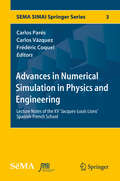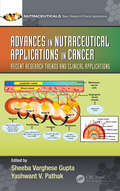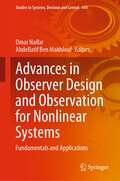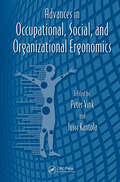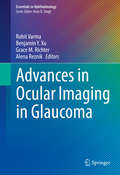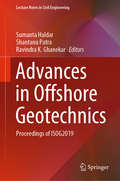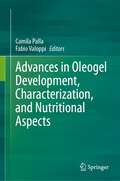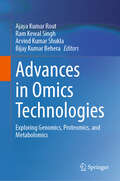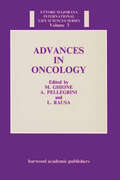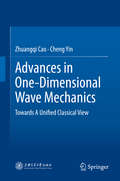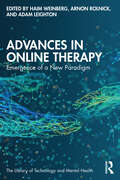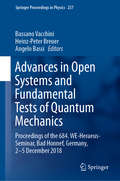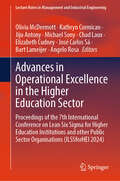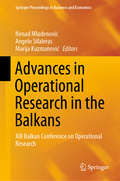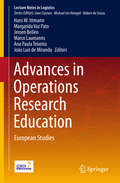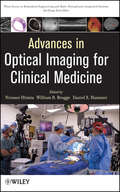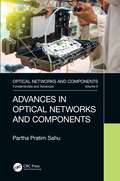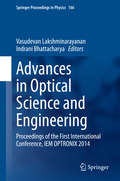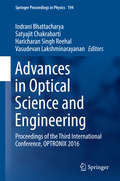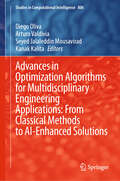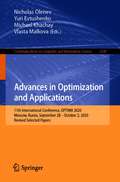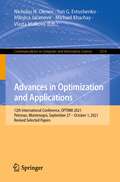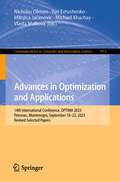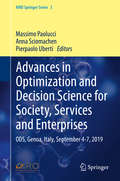- Table View
- List View
Advances in Numerical Simulation in Physics and Engineering: Lecture Notes of the XV 'Jacques-Louis Lions' Spanish-French School (SEMA SIMAI Springer Series #3)
by Carlos Vázquez Carlos Parés Frédéric CoquelThe book is mainly addressed to young graduate students in engineering and natural sciences who start to face numerical simulation, either at a research level or in the field of industrial applications. The main subjects covered are: Biomechanics, Stochastic Calculus, Geophysical flow simulation and Shock-Capturing numerical methods for Hyperbolic Systems of Partial Differential Equations. The book can also be useful to researchers or even technicians working at an industrial environment, who are interested in the state-of-the-art numerical techniques in these fields. Moreover, it gives an overview of the research developed at the French and Spanish universities and in some European scientific institutions. This book can be also useful as a textbook at master courses in Mathematics, Physics or Engineering.
Advances in Nutraceutical Applications in Cancer: Recent Research Trends and Clinical Applications (Nutraceuticals)
by Yashwant V. Pathak Sheeba Varghese GuptaDietary supplements and nutraceuticals such as Vitamin A and D, Omega-3 and probiotics are used as part of the cancer treatment as complimenting the main therapy. Several Nutraceuticals have shown to boost the immune responses, while emerging clinical studies and other research suggests that some plant-based agents may, indeed, impact late-stage cancer, influencing molecular processes corrupted by tumor cells to evade detection, expand clonally, and invade surrounding tissues. Advances in Nutraceutical Applications in Cancer: Recent Research Trends and Clinical Applications is an attempt to collect evidence and related clinical information of application of Nutraceuticals to be used in cancer treatment or compliment the cancer treatment. It contains 16 chapters written by experts in related field’s and covers many different aspects of the formulation and development of Nutraceuticals for cancer applications. This book covers efficacy, safety and toxicological aspects of nutraceuticals. It also addresses various novel drug delivery systems of nutraceuticals with anticancer properties, as well as nutraceuticals as supplements for cancer prevention. Features: Offers a comprehensive view of neutraceuticals’ role in cancer prevention and treatment Covers the applications and implications of neutraceuticals in prostate, colorectal, breast and gynecological cancers Discusses the principles of neutrigenomics and neutrigenetics in cancer prevention Explors the role of probiotics and micronutrients in cancer treatment and prevention Nutraceuticals can alter the gut microbiota. Gut microbiome undergoes changes during the disease status and followed by the cancer treatment. Nutraceutical’s role in proliferation and prevention of gynecological cancers, nutraceutical’s role in proliferation and prevention of prostate cancer and role of micronutrients in cancer prevention, both pros and cons, are some of the topics discussed in various chapters in this book. This book is addressed to scientists, clinicians, and students who are working in the area of Nutraceutical applications in cancer treatment.
Advances in Nutrition and Cancer (Cancer Treatment and Research #159)
by Vincenzo Zappia Salvatore Panico Gian Luigi Russo Alfredo Budillon Fulvio Della RagioneThis book comprises proceedings from the Third International Conference on Advances in Nutrition and Cancer, held in Naples in May 2012. This highly multidisciplinary meeting analyzed "nutrition and cancer" from different perspectives and on the basis of distinct and up-to-date experimental approaches. Knowledge on the relation between lifestyle, diet, and cancer is explored in a number of contributions, and the role of dietary intervention in cancer patients is discussed. Issues of vital interest to the research community, such as epidemiological and experimental oncology (genetics, epigenetics, and the mechanisms of action of natural compounds in the diet), receive detailed consideration. A further key topic is the emerging molecular technologies (the "omics") that can cast light on the interplay between nutrition and human malignancies. Chapters take the form of reviews that include sections presenting expert opinions.
Advances in Observer Design and Observation for Nonlinear Systems: Fundamentals and Applications (Studies in Systems, Decision and Control #410)
by Omar Naifar Abdellatif Ben MakhloufThis book discusses various methods for designing different kinds of observers, such as the Luenberger observer, unknown input observers, discontinuous observers, sliding mode observers, observers for impulsive systems, observers for nonlinear Takagi-Sugeno fuzzy systems, and observers for electrical machines. A hydraulic process system and a renewable energy system are provided as examples of applications.
Advances in Occupational, Social, and Organizational Ergonomics (Advances in Human Factors and Ergonomics Series)
by Jussi Kantola Peter VinkWorldwide the attention for health, innovation, and productivity is increasing. The need for knowledge and its applications is large and this book contributes to knowledge development as well as its application. The content varies from the effect that a new office interior has on its occupants, to the most efficient design for a glove. It examines topics as diverse as the facilitation of human interaction through workplace design and the improvement of virtual reality applications. Its 90 articles represent 24 countries on five continents.
Advances in Ocular Imaging in Glaucoma (Essentials in Ophthalmology)
by Rohit Varma Benjamin Y. Xu Grace M. Richter Alena ReznikServing as a practical guide to the ocular imaging modalities that are currently available to eye care providers for the care of glaucoma patients, this book provides information on advances in ocular imaging and their applications in the diagnosis and management of glaucoma. Each chapter introduces the imaging modality, highlight its strengths and weaknesses for clinical care, and discuss its integration into the clinical examination and decision-making process. The chapters also provide an in-depth description of the interpretation of images from each imaging modality. When appropriate, the chapters will summarize past and ongoing research and propose future research directions and clinical applications. This title will appeal to ophthalmologists and optometrists at all levels, from trainees to experienced clinicians looking to learn new and important information.
Advances in Offshore Geotechnics: Proceedings of ISOG2019 (Lecture Notes in Civil Engineering #92)
by Sumanta Haldar Shantanu Patra Ravindra K. GhanekarThis book comprises select proceedings of the First Indian Symposium on Offshore Geotechnics. It addresses state of the art and emerging challenges in offshore design and construction. The theme papers from leading academicians and practitioners provide a comprehensive overview of the broad topics encompassing various challenges in offshore geotechnical engineering. It covers various aspects pertaining to offshore geotechnics, such as offshore site investigation, soil characterization, geotechnics related to offshore renewable energy converters, offshore foundations and anchoring systems, pipelines, and deep sea explorations. This volume provides a comprehensive reference for professionals and researchers in offshore, civil and maritime engineering and for soil mechanics specialists.
Advances in Oleogel Development, Characterization, and Nutritional Aspects
by Camila Palla Fabio ValoppiAdvances in oleogel development, characterization, and nutritional aspects is the result of collaborative work by top experts in the field of oleogel and related areas, who have brought together the knowledge gained in two decades of work on the design, development, understanding, and application of oleogels and oleogel-based systems in a comprehensive and easy-to-read book. This book covers a wide spectrum of topics, ranging from the basic understanding of these lipid-based materials to their practical application in real food products, highlighting the latest breakthroughs in the field. It comprises in-depth descriptions of both canonical and most advanced and recent techniques for the physical, chemical, digestive and physiological characterization of oleogels, as well as some regulatory and industrial considerations relevant to their production. This multifaceted approach brings new tools, standpoints, and perspectives for understanding and applying oleogels, empowering current and new generations of scientists, students, and professionals who are approaching this topic for the first time, or who already have some experience, to become experts in this field.
Advances in Omics Technologies: Exploring Genomics, Proteomics, and Metabolomics
by Bijay Kumar Behera Ajaya Kumar Rout Ram Kewal Singh Arvind Kumar ShuklaThis comprehensive volume offers an in-depth exploration of the latest advancements in omics technologies and their practical applications across environmental science, agriculture, healthcare, and biotechnology. Covering key topics such as metagenomics for identifying beneficial microbes, bioremediation for environmental cleanup, bacteriophages, proteomics, epigenomics, and CRISPR-Cas9 genome editing, the book provides valuable insights into cutting-edge tools and methodologies. It also delves into next-generation sequencing, biosensor technology, bioinformatics tools, mass spectrometry-based metabolomics, as well as emerging fields like nutrigenomics and microarrays technology. With clear explanations and practical perspectives, this authoritative resource is ideal for students, researchers, and professionals striving to stay abreast of innovations in life sciences and contribute to the rapidly evolving landscape of omics sciences.
Advances in Oncology
by M. Ghione L. Rausa A. PellegriniFirst Published in 1988. This is a collection of the Proceedings of a course held at the International School of Medical Sciences Ettore Majorana Centre for Scientific Culture, Italy 5-13 September 1986.
Advances in One-Dimensional Wave Mechanics: Towards A Unified Classical View
by Zhuangqi Cao Cheng YinAdvances in One-Dimensional Wave Mechanics provides a comprehensive description of the motion of microscopic particles in one-dimensional, arbitrary-shaped potentials based on the analogy between Quantum Mechanics and Electromagnetism. Utilizing a deeper understanding of the wave nature of matter, this book introduces the concept of the scattered sub-waves and a series of new analytical results using the Analytical Transfer Matrix (ATM) method. This work will be useful for graduate students majoring in physics, mainly in basic quantum theory, as well as for academic researchers exploring electromagnetism, particle physics, and wave mechanics and for experts in the field of optical waveguide and integrated optics. Prof. Zhuangqi Cao is a Professor of Physics at Shanghai Jiao Tong University, China. Dr. Cheng Yin is a teacher at Jiangsu Key Laboratory of Power Transmission and Distribution Equipment Technology, Hohai University, China.
Advances in Online Therapy: Emergence of a New Paradigm
by Haim Weinberg Arnon Rolnick Adam LeightonAdvances in Online Therapy is the definitive presentation on online psychological intervention, which takes research and experiences of online therapy a step further by applying them to therapy in a post-pandemic world. This book addresses most of the main approaches and schools of individual, couple and family psychotherapy that are prevalent in the therapeutic field nowadays and explores how each of them adjust to online therapy. The reader will explore the main challenges and obstacles unique for each approach and how leading experts of those approaches overcome these challenges. The book also offers a relatively unique collection of the most practiced therapeutic approaches. In addition, the reader will explore specific issues that anyone who meets clients online should be aware of, like who is suitable for online counseling and who should be excluded, how to overcome resistance to online meetings, how to create online therapeutic alliance, enhancing online presence, and more. This book develops further the ideas and areas explored in the authors’ previous book, Theory and Practice of Online Therapy. Advances in Online Therapy aims to help mental health professionals and graduate students responsibly explore and expand their own ‘online comfort zone’.
Advances in Open Systems and Fundamental Tests of Quantum Mechanics: Proceedings of the 684. WE-Heraeus-Seminar, Bad Honnef, Germany, 2–5 December 2018 (Springer Proceedings in Physics #237)
by Bassano Vacchini Heinz-Peter Breuer Angelo BassiQuantum mechanics has shown unprecedented success as a physical theory, but it has forced a new view on the description of physical reality. In recent years, important progress has been achieved both in the theory of open quantum systems and in the experimental realization and control of such systems. A great deal of the new results is concerned with the characterization and quantification of quantum memory effects. From this perspective, the 684. WE-Heraeus-Seminar has brought together scientists from different communities, both theoretical and experimental, sharing expertise on open quantum systems, as well as the commitment to the understanding of quantum mechanics. This book consists of many contributions addressing the diversified physics community interested in foundations of quantum mechanics and its applications and it reports about recent results in open quantum systems and their connection with the most advanced experiments testing quantum mechanics.
Advances in Operational Excellence in the Higher Education Sector: Proceedings of the 7th International Conference on Lean Six Sigma for Higher Education Institutions and other Public Sector Organisations (ILSSforHEI 2024) (Lecture Notes in Management and Industrial Engineering)
by Jiju Antony Chad Laux Elizabeth Cudney Olivia McDermott Angelo Rosa José Carlos Sá Kathryn Cormican Michael Sony Bart LameijerThis book reports on advances in applications of Lean Six Sigma and Operational Excellence in Higher Education Institutes and in other Public Sector organisations with a special emphasis on Kaizen, Lean, Business Excellence Models, and Digitisation. Further topics include Leadership for Higher Education Institutes and public sectors in Operational Excellence and building a culture for Operational Excellence. Chapters report on theoretical research and case studies concerning Operational Excellence, Lean Six Sigma and Quality Management applications. Based on the 7th International Conference on Operational Excellence in Higher Educational Institutes and other public sector organisations (2024), held on September 2nd-3rd, 2024, at the University of Galway in Ireland, this book offers a timely reference for both academics and professionals in the broad field of Operational Excellence.
Advances in Operational Research in the Balkans: XIII Balkan Conference on Operational Research (Springer Proceedings in Business and Economics)
by Angelo Sifaleras Nenad Mladenović Marija KuzmanovićThis proceedings volume presents recent theoretical and practical advances in operational research (OR). The papers focus on a number of key areas including combinatorial optimization, integer programming, heuristics, and mathematical programming. In addition, this volume highlights OR applications in different areas such as financial decision making, marketing, e-business, project management, scheduling, traffic and transportation. The chapters are based on papers presented at the 13th Balkan Conference on Operations Research (BALCOR). BALCOR is an established biennial conference. The selected papers promote international collaboration among researchers and practitioners, with a particular focus on the Balkan countries.
Advances in Operations Research Education: European Studies (Lecture Notes in Logistics)
by João Luís de Miranda Jeroen Beliën Ana Paula Teixeira Hans W. Ittmann Marco Laumanns Margarida Vaz PatoThis edited monograph contains a comprehensive overview of educational developments in the fields of operations research (OR) and management science (MS). The book outlines key factors in OR/MS curricular programs and analyses different approaches regarding student enrollment and failure rates. The approach is genuinely international, whereas the focus lies on the European level. The target audience primarily comprises public policy planners in education, deans and school directors as well as program coordinators.
Advances in Optical Imaging for Clinical Medicine (Wiley Series in Biomedical Engineering and Multi-Disciplinary Integrated Systems #6)
by Nicusor Iftimia William R. Brugge Daniel X. HammerThis book provides students, teachers, researchers and clinicians with a strong and established source of information on advanced optical technologies that show real promise of being translated to clinical use.
Advances in Optical Networks and Components
by Partha Pratim SahuThis book is intended as a graduate/post graduate level textbook for courses on high-speed optical networks as well as computer networks. The ten chapters cover basic principles of the technology as well as latest developments and further discuss network security, survivability, and reliability of optical networks and priority schemes used in wavelength routing. This book also goes on to examine Fiber To The Home (FTTH) standards and their deployment and research issues and includes examples in all the chapters to aid the understanding of problems and solutions. Presents advanced concepts of optical network devices Includes examples and exercises inall the chapters of the book to aid the understanding of basic problems and solutions for undergraduate and postgraduate students Discusses optical ring metropolitan area networks and queuing system and its interconnection with other networks Discusses routing and wavelength assignment Examines restoration schemes in the survivability of optical networks
Advances in Optical Science and Engineering: Proceedings of the First International Conference, IEM OPTRONIX 2014 (Springer Proceedings in Physics #166)
by Vasudevan Lakshminarayanan Indrani BhattacharyaThe Proceedings of First International Conference on Opto-Electronics and Applied Optics 2014, IEM OPTRONIX 2014 presents the research contributions presented in the conference by researchers from both India and abroad. Contributions from established scientists as well as students are included. The book is organized to enable easy access to various topics of interest. The first part includes the Keynote addresses by Phillip Russell, Max Planck Institute of the Light Sciences, Erlangen, Germany and Lorenzo Pavesi, University of Trento, Italy. The second part focuses on the Plenary Talks given by eminent scientists, namely, Azizur Rahman, City University London, London; Bishnu Pal, President, The Optical Society of India; Kamakhya Ghatak, National Institute of Technology, Agartala; Kehar Singh, Former Professor, India Institute of Technology Delhi; Mourad Zghal, SUPCOM, University of Carthage, Tunisia; Partha Roy Chaudhuri, IIT Kharagpur; S K. Bhadra, CSIR-Central Glass and Ceramic Research Institute, Kolkata; Sanjib Chatterjee, Raja Ramanna Centre for Advanced Technology, Indore; Takeo Sasaki, Tokyo University, Japan; Lakshminarayan Hazra, Emeritus Professor, University of Calcutta, Kolkata; Shyam Akashe, ITM University, Gwalior and Vasudevan Lakshminarayanan, University of Waterloo, Canada. The subsequent parts focus on topic-wise contributory papers in Application of Solar Energy; Diffraction Tomography; E. M. Radiation Theory and Antenna; Fibre Optics and Devices; Photonics for Space Applications; Micro-Electronics and VLSI; Nano-Photonics, Bio-Photonics and Bio-Medical Optics; Non-linear Phenomena and Chaos; Optical and Digital Data and Image Processing; Optical Communications and Networks; Optical Design; Opto-Electronic Devices; Opto-Electronic Materials and Quantum Optics and Information Processing.
Advances in Optical Science and Engineering: Proceedings of the Third International Conference, OPTRONIX 2016 (Springer Proceedings in Physics #194)
by Vasudevan Lakshminarayanan Indrani Bhattacharya Satyajit Chakrabarti Haricharan Singh ReehalThe Proceedings of 3rd International Conference on Opto-Electronics and Applied Optics, OPTRONIX 2016 is an effort to promote and present the research works by scientists and researchers including students in India and abroad in the area of Green Photonics and other related areas as well as to raise awareness about the recent trends of research and development in the area of the related fields. The book has been organized in such a way that it will be easier for the readers to go through and find out the topic of their interests. The first part includes the Keynote addresses by Rajesh Gupta, Department of Energy Science and Engineering, Indian Institute of Technology, Bombay; P. T. Ajith Kumar, President and Leading Scientist Light Logics Holography and Optics, Crescent Hill, Trivandrum, Kerala; and K. K. Ghosh, Institute of Engineering & Management, Kolkata, India. The second part focuses on the Plenary and Invited Talks given by eminent scientists namely, Vasudevan Lakshminarayanan, University of Waterloo, Canada; Motoharu Fujigaki, University of Fukuii, Japan; Takeo Sasaki, Tokyo University of Science, Japan; Kehar Singh, Former Professor, Indian Institute of Technology, Delhi, India; Rajpal S. Sirohi, Tezpur University, India; Ajoy Kumar Chakraborty, Institute of Engineering & Management, India; Lakshminarayan Hazra, Emeritus Professor, Calcutta University, India; S. K. Bhadra, Emeritus Scientist, Indian Institute of Chemical Biology, India; Partha Roy Chaudhuri, Department of Physics, Indian Institute of Technology, Kharagpur, India; Navin Nishchal, Indian Institute of Technology, Patna, India; Tarun Kumar Gangopadhyay, CSIR-Central Glass and Ceramic Research Institute, India; Samudra Roy, Department of Physics, Indian Institute of Technology, Kharagpur, India; Kamakhya Ghatak, University of Engineering & Management, India. The subsequent parts focus on contributory papers in : Green Photonics; Fibre and Integrated Optics; Lasers, Interferometry; Optical Communication and Networks; Optical and Digital Data and Image Processing; Opto-Electronic Devices, Terahertz Technology; Nano-Photonics, Bio-Photonics, Bio-Medical Optics; Lasers, Quantum Optics and Information Technology; E. M. Radiation Theory and Antenna; Cryptography; Quantum and Non-Linear Optics, Opto-Electronic Devices; Non-Linear Waveguides; Micro-Electronics and VLSI; Interdisciplinary.
Advances in Optimization Algorithms for Multidisciplinary Engineering Applications: From Classical Methods to AI-Enhanced Solutions (Studies in Computational Intelligence #806)
by Diego Oliva Kanak Kalita Arturo Valdivia Seyed Jalaleddin MousaviradThis book is an authoritative compilation of the latest advancements in optimization techniques. This book covers a wide array of methods ranging from classical to metaheuristic to AI-enhanced approaches. The chapters are meticulously selected and organized in three sections—metaheuristics, machine learning and engineering applications. This allows for an in-depth exploration of diverse topics ranging from image processing to feature selection to data clustering, to practical applications like energy optimization, smart grids, healthcare diagnostics, etc. Each chapter delves into the specific algorithms and applications as well as provides ample theoretical insights. Accordingly, this book is ideally suited for undergraduate and postgraduate students in fields such as science, engineering and computational mathematics. It is also an invaluable resource for courses on artificial intelligence, computational intelligence, etc. Researchers and professionals in evolutionary computation, artificial intelligence and engineering will find the material especially useful for advancing their work and exploring new frontiers in optimization.
Advances in Optimization and Applications: 11th International Conference, OPTIMA 2020, Moscow, Russia, September 28 – October 2, 2020, Revised Selected Papers (Communications in Computer and Information Science #1340)
by Michael Khachay Vlasta Malkova Nicholas Olenev Yuri EvtushenkoThis book constitutes the refereed proceedings of the 11th International Conference on Optimization and Applications, OPTIMA 2020, held in September – October 2020. Due to the COVID-19 pandemic the conference was held online. The 18 revised full papers presented were carefully reviewed and selected from 60 submissions. The papers are organized intopical sections on global optimization; combinatorial and discrete optimization; optimal control; optimization in economy, finance and social sciences; applications.
Advances in Optimization and Applications: 12th International Conference, OPTIMA 2021, Petrovac, Montenegro, September 27 – October 1, 2021, Revised Selected Papers (Communications in Computer and Information Science #1514)
by Michael Khachay Milojica Jaćimović Vlasta Malkova Nicholas N. Olenev Yuri G. EvtushenkoThis book constitutes the refereed proceedings of the 12th International Conference on Optimization and Applications, OPTIMA 2021, held in Petrovac, Montenegro, in September - October 2021. Due to the COVID-19 pandemic the conference was partially held online. The 19 revised full papers presented were carefully reviewed and selected from 38 submissions. The papers are organized in topical sections on mathematical programming; global optimization; stochastic optimization; optimal control; mathematical economics; optimization in data analysis; applications.
Advances in Optimization and Applications: 14th International Conference, OPTIMA 2023, Petrovac, Montenegro, September 18–22, 2023, Revised Selected Papers (Communications in Computer and Information Science #1913)
by Michael Khachay Milojica Jaćimović Vlasta Malkova Nicholas Olenev Yuri EvtushenkoThis book constitutes the refereed proceedings of the 14th International Conference on Advances in Optimization and Applications, OPTIMA 2023, held in Petrovac, Montenegro, during September 18–22, 2023.The 21 full papers included in this book were carefully reviewed and selected from 68 submissions. They were organized in topical sections as follows: mathematical programming; global optimization; continuous optimization; discrete and combinatorial optimization; optimal control; game theory and mathematical economics; optimization in economics and finance; and applications.
Advances in Optimization and Decision Science for Society, Services and Enterprises: ODS, Genoa, Italy, September 4-7, 2019 (AIRO Springer Series #3)
by Massimo Paolucci Anna Sciomachen Pierpaolo UbertiThe contributions included in the volume are drawn from presentations at ODS2019 – International Conference on Optimization and Decision Science, which was the 49th annual meeting of the Italian Operations Research Society (AIRO) held at Genoa, Italy, on 4-7 September 2019. This book presents very recent results in the field of Optimization and Decision Science. While the book is addressed primarily to the Operations Research (OR) community, the interdisciplinary contents ensure that it will also be of very high interest for scholars and researchers from many scientific disciplines, including computer sciences, economics, mathematics, and engineering. Operations Research is known as the discipline of optimization applied to real-world problems and to complex decision-making fields. The focus is on mathematical and quantitative methods aimed at determining optimal or near-optimal solutions in acceptable computation times. This volume not only presents theoretical results but also covers real industrial applications, making it interesting for practitioners facing decision problems in logistics, manufacturing production, and services. Readers will accordingly find innovative ideas from both a methodological and an applied perspective.
